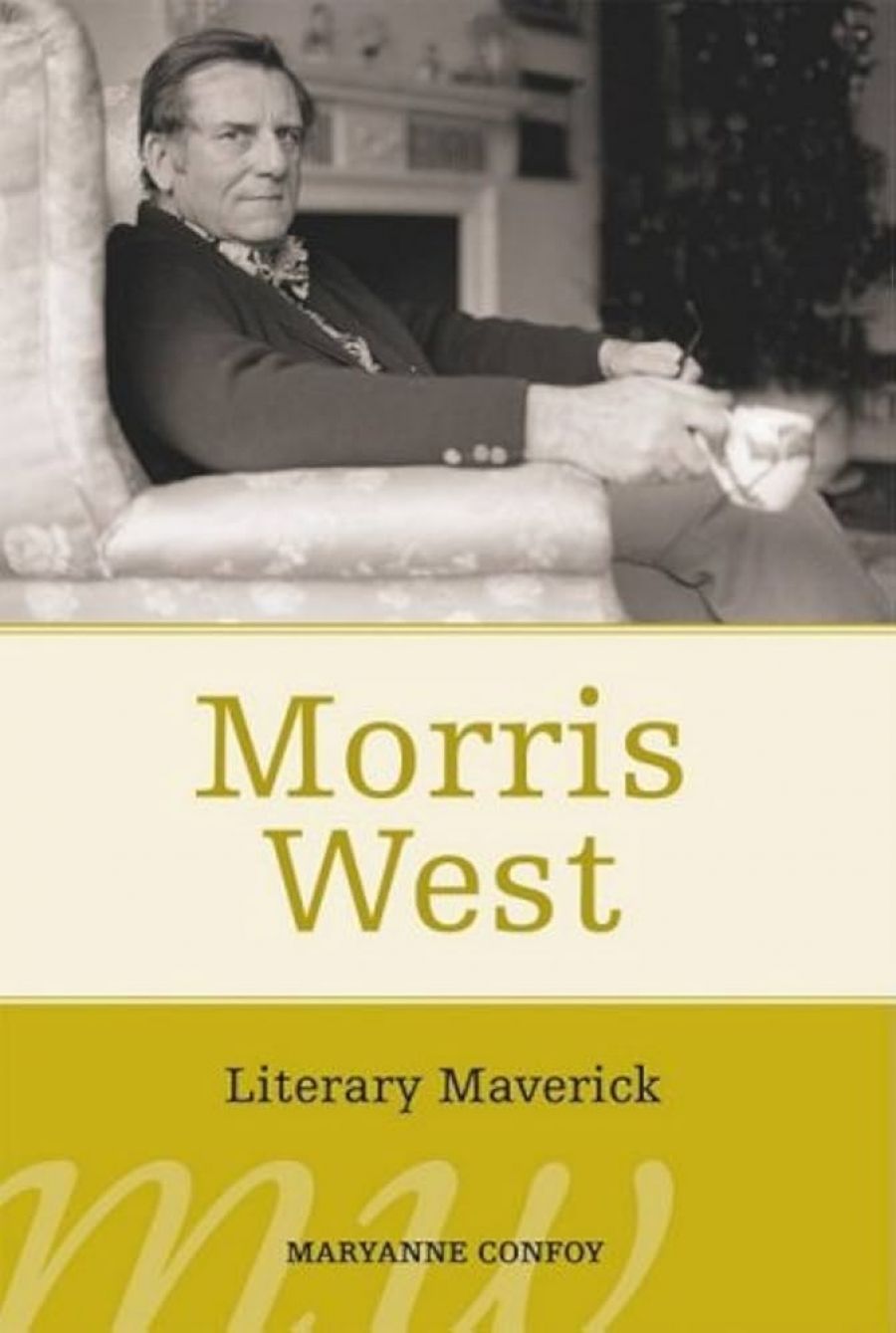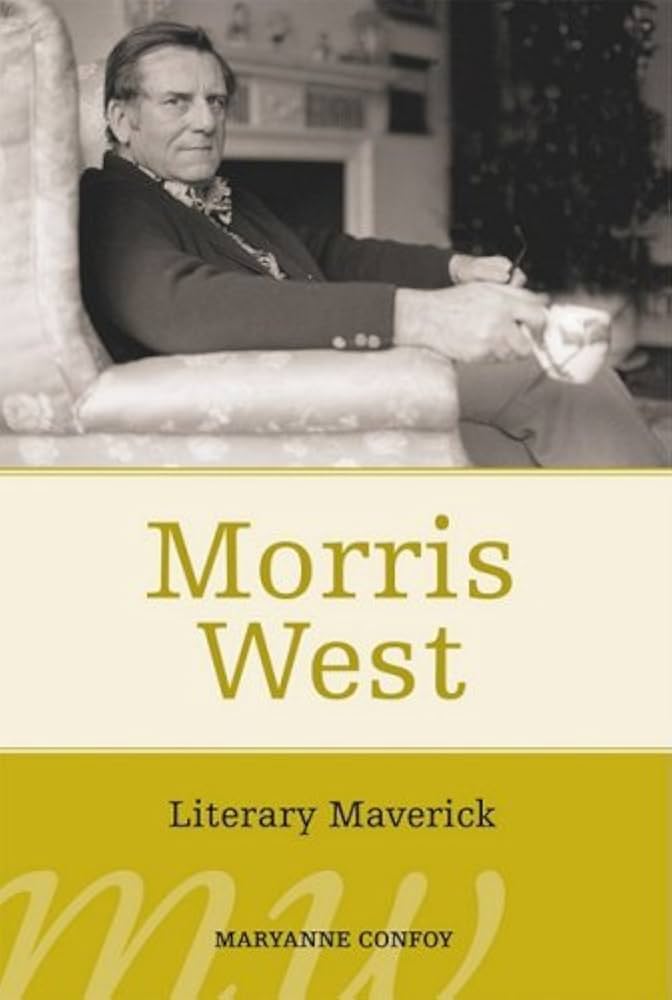
- Free Article: No
- Contents Category: Literary Studies
- Review Article: Yes
- Article Title: Man without a shadow
- Online Only: No
- Custom Highlight Text:
Few Australian authors have been so prolific or so well-rewarded for their labours: twenty-six novels, as well as plays and a reluctant memoir; not to mention advances – in the 1960s – of hundreds of thousands of American dollars per book. How many of our writers have sold copies of their works in tens of millions, let alone been translated into twenty-seven languages at last count? None has been so prescient in his fiction, whether predicting papal succession, international terrorism, the quagmire of Vietnam, or another Arab–Israeli war. Yet the author of whom all this is more or less true is largely without critical honour in his own country. The author is Morris West (1916–99), who had the distinction of emulating Charles Dickens by dying at his desk with an unfinished manuscript before him. In West’s case, this was The Last Confession (2001), another of his attempts to understand the brave heretic and Renaissance martyr Giordano Bruno. Of Bruno, West wrote ‘the better I knew him, the more modern I found him’.
- Book 1 Title: Morris West
- Book 1 Subtitle: Literary maverick
- Book 1 Biblio: John Wiley & Sons, $29.95pb, 304pp, 1 74031 119 1
- Book 1 Cover Small (400 x 600):

- Book 1 Cover (800 x 1200):

At last, West’s capacious and sometimes controversial career has been rewarded with a biographer. Maryanne Confoy has written of him before, in Morris West: Wandering Scholar and Restless Spirit (published in 1992 by the National Library of Australia, an institution to which West gave long and generous support). Now she has reckoned with the whole life, conscious of West’s own autobiographical reticence, particularly concerning his childhood. She also faces the difficulty of recovering this crusty but courteous cosmopolitan, conflicted Catholic, linguist and best-selling author for a modern audience to whom he may seem as remote as anyone who died as long ago as 1999.
This was the person, moreover, who called himself ‘a man without a shadow’, and who disarmingly, or disingenuously, wrote that ‘the chronicles of my works and days have … been preserved under the decent draperies of fiction’. Nevertheless, Confoy has discharged the biographer’s task assiduously and equably, setting West against the canvas of a broken home in Depression Australia, his service as a trainee Christian Brother and then as a cipher officer in wartime, success in the ‘golden years’ of Australian radio and then – following a failed first marriage – a breakaway overseas. That led to greater fame in Britain and the US than he ever enjoyed at home.
The subtitle of Confoy’s book calls West a ‘literary maverick’ without satisfactorily fitting him to the description. He was, perhaps, a maverick in business, seeing the future in radio-script production and profiting before television loomed. His considerable income from writing was supplemented by investments that let him buy yachts that would not embarrass a modern tycoon. In his dealings with publishers, notably William Morrow in the US from 1957 to 1983, West was tough and adversarial, for all the warm friendship that he enjoyed with Larry Hughes, president of the company for much of that time. West would not readily submit to editing, nor accept responsibility for declining sales in his later years. But this is not the action of a maverick, any more than his championing of fellow writers, as one of the founders of the Australian Society of Authors.
West emerges in his relations with the Catholic Church. His aunt supported him at the Christian Brothers’ College in St Kilda, and he entered the order, leaving in 1939. The crisis, Confoy suggests, was not over faith, but sexuality. Soon afterwards, West married a woman ten years his senior, whom he had thought only five years older than he. That discrepancy was revealed when they acquired passports for a first trip to Europe. For West, travel was an experience of delight and fulfilled expectations that also helped to doom the marriage. Leaving his wife and two children for the secretary of his Australian Radio Productions, West then sought an annulment of the marriage. The church’s refusal to grant it made him an embittered outsider to its communion and obsessive in his attempts to have that decision overturned, that alleged injustice exposed. But West never abandoned the Catholic Church. As he wrote in The Clowns of God (1981), second in his trilogy of papal novels: ‘Once you accept the existence of God … then you are caught forever with his presence in the centre of all things.’ However, as Confoy notes perceptively, while West ‘consistently affirmed his belief in a God of love and mercy … his writings explore a God of darkness, of absence, and of mystery’.
Confoy writes sympathetically of the ‘cultural context of economic hardship and religious prejudice’ into which West was born. The first he extravagantly overcame; the second, his most earnest combat could not defeat. The subsidence of his parents’ marriage is sheeted home to the salesman father, who drank, gambled and parked outside another woman’s house. In this depiction, the suffering mother also risks caricature. But the steel went into West, who described his childhood bleakly as the ‘systematic eradication of family ties’. A series of flights followed: into and out of the church; then the same for marriage. After that, he spent the next quarter of a century outside Australia. Yet in this period, the triumph of West’s will is more significant than his tribulations. In Italy in the 1950s he became famous for his non-fiction book on the slum kids of Naples (Eleanor Roosevelt afforded the blurb for the paperback), Children of the Sun (1957). This was followed by The Devil’s Advocate (1959), his impassioned first fictional inquiry into the workings of the Catholic Church.
While she leads us dutifully around some, if not all, of West’s novels, Confoy’s heart is rather with that engagement between institution and estranged believer. More might have been made of West’s ‘moral thrillers’ which – the occasional woodenness of the style apart – are astute, well-researched and never simple in the political and ethical issues that they confront. Those powerful in the world’s eyes, whether their business is financial or ecclesiastical, find that success is always flawed and costly. West writes acutely, too, of vengeance and betrayal. Although she insists that it is sorrily the case, Confoy needed to enquire further into the neglect, if not active critical disdain, of West in Australia – beyond the lamentable incivilities of the audience at the notorious New South Wales Premier’s Awards dinner in 1985, when West was guest speaker. Perhaps West succeeded overseas too early and completely for some envious locals to forgive him. His many loyal readers in this country hardly saw that point. Moreover, as Confoy shows, West was the most responsible of citizens in the literary and wider community to which he returned in the early 1980s.
Both those communities will be indebted to a book written with such care and indeed love. Confoy’s fine biography might revive interest in a stellar career, let alone in the aspects of Australian social history that it richly illuminates. These include the experience of a Christian Brother and a radio entrepreneur, of a man battling from within his church, of an author who wrote popular fiction of an unfailingly serious kind, of an expatriate who thought of himself not in that way, but as a dutiful citizen of the world.


Comments powered by CComment